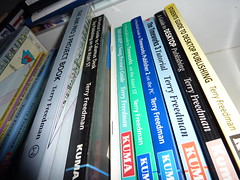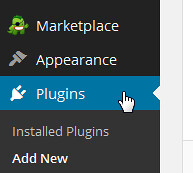 A couple of weeks ago I asked: Is Digital Rights Management effective against piracy?
A couple of weeks ago I asked: Is Digital Rights Management effective against piracy?2000AD ditches DRM
 A couple of weeks ago I asked: Is Digital Rights Management effective against piracy?
A couple of weeks ago I asked: Is Digital Rights Management effective against piracy? A couple of weeks ago I asked: Is Digital Rights Management effective against piracy?
A couple of weeks ago I asked: Is Digital Rights Management effective against piracy? Well, the London Book Fair has been and gone. Is it only a week ago that I was trudging home with publishers’ catalogues and notes from the various sessions I attended?
Well, the London Book Fair has been and gone. Is it only a week ago that I was trudging home with publishers’ catalogues and notes from the various sessions I attended?
I found it really useful: three days’-worth of excellent talks and discussions, for the princely sum of £35.
 A recent piece of research from the Authors’ Licensing and Collecting Society (ALCS) makes for some depressing reading – unless you are extremely optimistic.
A recent piece of research from the Authors’ Licensing and Collecting Society (ALCS) makes for some depressing reading – unless you are extremely optimistic.
The figures relate to 2013, and are not as good as their equivalents of ten years ago, in 2005. Well, not for the most part anyway. Here are some of them:
 I spent another day at the London Book Fair today. This time, I had earmarked just two talks to go to, the rest of my time being given over to wandering around and seeing what looked interesting.
I spent another day at the London Book Fair today. This time, I had earmarked just two talks to go to, the rest of my time being given over to wandering around and seeing what looked interesting. I always look forward to the London Book Fair – I think it’s the thrill of being surrounded by so many books! Today was the first of three, and I used it to attend seminars for the most part.
I always look forward to the London Book Fair – I think it’s the thrill of being surrounded by so many books! Today was the first of three, and I used it to attend seminars for the most part. After quite a long gap, I’ve decided to self-publish a few books. I thought it might be interesting to write up my journey, because perhaps the research I undertake will be beneficial to others.
After quite a long gap, I’ve decided to self-publish a few books. I thought it might be interesting to write up my journey, because perhaps the research I undertake will be beneficial to others. One of the things I’ve learnt over the years is that if my antivirus program tells me there is a new version that I need to install, I always create a system restore point (I’m using a PC). Why? Because on almost every occasion something doesn’t work afterwards.
One of the things I’ve learnt over the years is that if my antivirus program tells me there is a new version that I need to install, I always create a system restore point (I’m using a PC). Why? Because on almost every occasion something doesn’t work afterwards. After quite a long gap, I’ve decided to self-publish a few books. I thought it might be interesting to write up my journey, because perhaps the research I undertake will be beneficial to others.
After quite a long gap, I’ve decided to self-publish a few books. I thought it might be interesting to write up my journey, because perhaps the research I undertake will be beneficial to others.
Today I’m looking at whether or not you should choose Digital Rights Management, or DRM, as a way of preventing your ebooks being illegally copied.
After quite a long gap, I’ve decided to self-publish a few books. I thought it might be interesting to write up my journey, because perhaps the research I undertake will be beneficial to others.
Today I’m looking at why have I chosen self-publishing rather than traditional publishing.
After quite a long gap, I’ve decided to self-publish a few books. I thought it might be interesting to write up my journey, because perhaps the research I undertake will be beneficial to others.
Today, I’m clarifying what the term self-publishing means because, unfortunately, it’s not as obvious as you might think.
Starting tomorrow, a new series of occasional posts about my research into self-publishing.
The first two articles are:
 There are lots of books about writing – so many, in fact, that you could comfortably avoid doing any writing at all simply by setting out to read them all. There does come a point where you need to actually sit down and write. But if there is one book that is worth taking time out to read, and use as a reference, it's Business for Authors.
There are lots of books about writing – so many, in fact, that you could comfortably avoid doing any writing at all simply by setting out to read them all. There does come a point where you need to actually sit down and write. But if there is one book that is worth taking time out to read, and use as a reference, it's Business for Authors. It's important to be published by a traditional publisher
It's important to be published by a traditional publisher
Image by Terry Freedman via Flickr
In this day and age, in which anyone can publish and distribute their books electronically, or self-publish them by going down several routes (none of which need include the traditional vanity publisher), why should anyone bother approaching a traditional publisher? After all, very few of the thousands of manuscripts that publishers receive find their way into book form, and of those that do, very few hit the big time. There are, in fact, at least 4 reasons to try to get published by the age-old process of going to publishers.
 The History and Art of Comic Books is a course at the City Lit college in London. There are several courses on graphic design, and even one for learning how to create cartoons and comics. This one, however, is not so much hands on, but a romp through several decades of comic book art in four weeks.
The History and Art of Comic Books is a course at the City Lit college in London. There are several courses on graphic design, and even one for learning how to create cartoons and comics. This one, however, is not so much hands on, but a romp through several decades of comic book art in four weeks. People say “It’s all a matter of context”. But I think that it’s when you take ideas, styles or objects out of context, or juxtapose them with apparently incongruent other ideas, styles or objects , that things start to look interesting and exciting.
People say “It’s all a matter of context”. But I think that it’s when you take ideas, styles or objects out of context, or juxtapose them with apparently incongruent other ideas, styles or objects , that things start to look interesting and exciting. Like many people I suppose, when I have written about the effects of the new rule on value-added tax, I’ve done so from the point of view of myself, as a seller of ebooks. But what of the costs to readers?
Like many people I suppose, when I have written about the effects of the new rule on value-added tax, I’ve done so from the point of view of myself, as a seller of ebooks. But what of the costs to readers?I would love to be able to write blog posts or conduct my social media affairs in such a way that I became an overnight sensation, as verified by an astronomical rise in my bank balance.
That’s why I tend to read a lot of adverts that say things like “How I turned my blog into a licence to print money in just three months!”
 It’s a good idea to keep backups of your day-to-day documents, so it makes sense to back up your blog too. In this short series I’m looking at ways to do that. Last time I covered how to back up your blog if you use Blogger, in the article Backing up your Blogger blog. Today, I’ll take you through the process of backing up a blog if you use Wordpress.
It’s a good idea to keep backups of your day-to-day documents, so it makes sense to back up your blog too. In this short series I’m looking at ways to do that. Last time I covered how to back up your blog if you use Blogger, in the article Backing up your Blogger blog. Today, I’ll take you through the process of backing up a blog if you use Wordpress. Ever wondered how to win the Booker Prize? Well, thanks to the Slow Journalism company’s data-crunching, the secret is revealed. Hint: it helps if you are a 50 year-old man working on his fourth novel, apparently!
Ever wondered how to win the Booker Prize? Well, thanks to the Slow Journalism company’s data-crunching, the secret is revealed. Hint: it helps if you are a 50 year-old man working on his fourth novel, apparently!
Here’s the data.